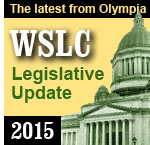STATE GOVERNMENT
Legislative Update: Can we get fair hearings?
Minimum wage, sick leave will get Senate hearings, but many others met with silence
UPDATE (March 26, 2015) — HB 1646, the Equal Pay Opportunity Act, has been added to the hearing schedule in the Senate Commerce and Labor Committee for Monday, March 30 from 1:30 to 3:30 p.m., along with the minimum wage and paid sick leave bills.

 Today’s edition of the WSLC Legislative Update newsletter:
Today’s edition of the WSLC Legislative Update newsletter:
OLYMPIA (March 23, 2015) — Two key bills in the Washington State Labor Council’s Shared Prosperity Agenda — raising the minimum wage and granting paid sick leave — will get hearings in the Senate Commerce and Labor Committee at 1:30 p.m. on Monday, March 30. But those bills are the exceptions.
Several other important bills, including some that passed the House with bipartisan support, are languishing in that committee with no votes or hearings planned. As the clock continues to tick on the 2015 session, these policy bills face a cutoff deadline of April Fools’ Day to advance from committee, or they die.
It’s up to Sen. Michael Baumgartner (R-Spokane), who chairs the Senate Commerce and Labor Committee, to decide whether to allow fair hearings on these bills. To his credit, he is allowing a hearing on the minimum wage and paid sick leave bills, two bills that have earned a lot of press interest and momentum:
► HB 1355 raises the state minimum wage over four years to $12 an hour. In 2015, full-time minimum wage workers here still earn less than $20,000 per year. The minimum wage is supposed to assure “the maintenance of the minimum standard of living necessary for health, efficiency, and general well being of workers.” But families don’t meet this standard with such low pay and taxpayers end up subsidizing their poverty-wage employers because their workers can’t afford to meet their families’ basic needs and require public assistance for food, housing, and health care.
► HB 1356 allows all workers to earn paid sick leave to take care of themselves or a loved one when they are sick. One million people in this state lack paid sick leave and must make the cruel choice of working sick or losing a day’s wages. It endangers public health when cooks, servers, and health-care workers expose others to their illnesses by working sick. Paid sick leave will provide some economic stability to families who are at the margins, and will promote good public health practices.
So these bills will be heard at 1:30 p.m. on March 30 and all supporters are invited to come to Olympia to find out what kind of hearings the bill get. Will Sen. Baumgartner agree to a fair and open discussion on these important working family bills, or will he stack the testimony with opponents, as has happened a few times in his committee this session?
That’s the sound… of silence
 In the meantime, what of the many other bills — those that haven’t received as much publicity, but are nonetheless important legislation affecting many working families?
In the meantime, what of the many other bills — those that haven’t received as much publicity, but are nonetheless important legislation affecting many working families?
Here are a few examples of House-approved bills that have no hearings or committee votes scheduled in Sen. Baumgartner’s Commerce and Labor Committee as of today:
► HB 1646, the Equal Pay Opportunity Act sponsored by Rep. Tara Senn (D-Mercer Island), would update our state’s 1943 equal pay law to ensure that employees are able to openly discuss and inquire about their wages without fear of retaliation. This kind of pay transparency is a vital step toward ensuring that the persistent gender wage gap is finally closed. The bill has bipartisan sponsorship, got a bipartisan vote out of committee, and a bipartisan vote off the House floor. In the spirit of breaking through political gridlock in Olympia, this bill should be heard and voted out of the Senate Commerce and Labor Committee.
► HB 1863, sponsored by Rep. Chris Reykdal (D-Olympia), would allow community and technical colleges to use local funds to fulfill the bargaining agreements negotiated with their faculty. The state’s share of higher education funding has reduced in recent years, only under current law only state funds can be used for faculty pay and not local funds like tuition. As a result, not only has it been six years since college faculty have received a cost-of-living pay adjustment, they haven’t even gotten step increases on their salary during that period. HB 1863 would fix that by creating a shared responsibility between the colleges and the state for investing in both part- and full-time faculty. More than that, it will create a fair, stable, and accountable funding stream. The House passed HB 1863 on a 64-34 vote, with 13 House Republicans joining to vote for its passage. But to date, the bill is languishing in the Senate Commerce and Labor Committee.
► HB 1732, also sponsored by Rep. Reykdal, would ensure that nurses and certain other health care employees can get uninterrupted meal and rest breaks, and prohibit mandatory overtime for certain health care employees. This is important for the safety of both health care workers and their patients. It passed the House and awaits action in Baumgartner’s committee.
Like the minimum wage and paid sick leave proposals, these bills have until Wednesday, April 1 to advance from the Senate Commerce and Labor Committee. The Washington State Labor Council urges fair hearings and votes for all of them.
America’s most unfair tax system: Washington can, must do better
This month, many state legislators had town hall meetings in their home districts and reports indicate that quite of few of them got an earful about the budget, about Washington’s unfair tax system, and about the need for a more stable revenue system.
Washington state lacks the revenue to adequately maintain its most basic services and is under court order to improve funding of basic education, mental health services, and some other functions of state government.
This is because our state has the most unfair and unstable revenue system in the nation. Worse than Texas. Worse than South Dakota. Worse than Mississippi. Worse than Florida. In Washington, the wealthiest among us pay just 2% of their incomes in taxes, while middle-class families pay 10% and low-income families pay up to 17% of their earnings on taxes. Meanwhile, huge profitable corporations get billions in special tax exemptions each year, while the state’s small businesses pay more.
Lack of revenue combined with the recession has resulted in $12 billion in cuts and chronic underfunding that hurt everyone from schoolchildren to our seniors. As our population has increased, state services have diminished. We face rapidly growing needs that cannot be met without new revenue.
That’s why the Washington State Labor Council is a part of Washington United for Fair Revenue a grassroots campaign of more than 100 organizations working to adopt a fair, accountable and shared revenue system with stable and sufficient revenues.
We are urging legislators to ask wealthier households and corporations to pay their fair share so we can fully fund schools, expand health care, repair our infrastructure, create jobs, and build an economy that works for all of us. Learn more at FairWArevenue.org.
Don’t rob pensions to balance budget
 One way to make our state revenue system even more unfair than it already is would be to try to balance the budget on the backs of state employees by eroding Washington’s healthy public retirement system.
One way to make our state revenue system even more unfair than it already is would be to try to balance the budget on the backs of state employees by eroding Washington’s healthy public retirement system.
Two bad pension bills sponsored by Sen. John Braun (R-Centralia) have surfaced that propose to dig our state out of its multi-billion dollar budget deficit by paying for much of that shortfall directly from state employee pension benefits. On Tuesday, March 24, the Senate Ways and Means Committee will hold hearings on:
► SB 5982 to raise the normal retirement age across all public pension systems by two years. (It would not apply to PERS 1, which closed to new enrollees in 1977). State workers who could now retire at age 65 without penalty would have to wait until they are 67. This would cost future retirees an estimated $3 billion over 25 years, according to the fiscal note.
► SB 6005 would set the maximum pension contribution no higher than the state average annual wage. The cost to future retirees is an estimated $8.7 billion between 2015 and 2040.
The bills are prospective, only applying to new hires, but they still harm current employees and retirees. They erode the overall financial health of Washington’s public retirement system, the fourth best-managed pension fund in the nation. There’s a reason our state hasn’t faced problems that have happened in places like Chicago or Detroit.
These bills cut more than $11 billion from the pension system over the next 25 years. That means the state pays less money from the state General Fund for employee benefits — money that would then be diverted to cover the budget shortfalls on education and mental health. In other words, supporters of these bad pension schemes think public servants should foot the bill instead of closing the billions in tax loopholes or considering other revenue options.
Robbing state employees’ pension benefits to pay for the Legislature’s inability to meet its other obligations isn’t right and it isn’t fair.





